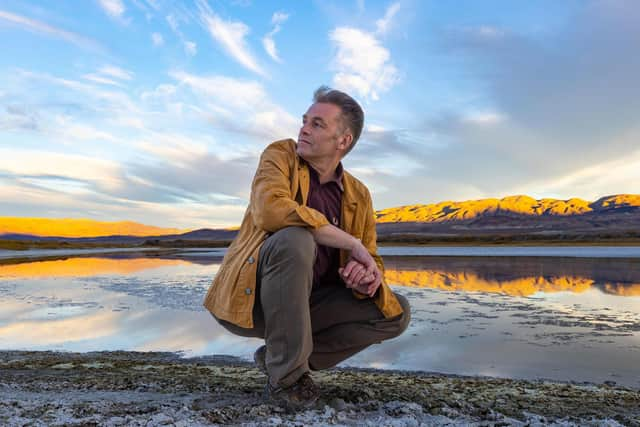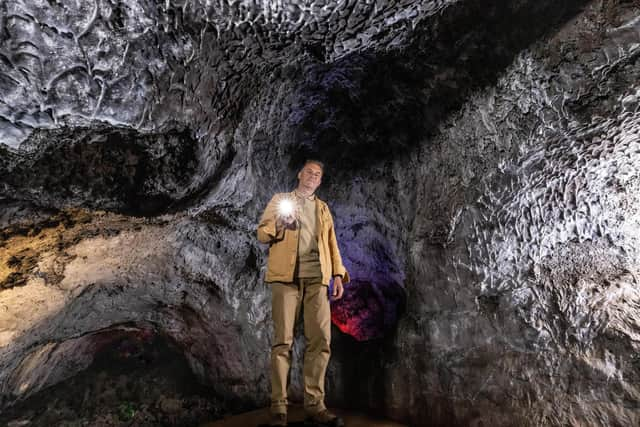Chris Packham on new BBC series Earth: 'We're not acting quickly enough on climate crisis'
“I see and feel climate change as a naturalist every day,” he says. “I feel it every time I go out my door. I see species that have arrived and I note the absence of other things. I see the seasons have gone haywire since I was a kid in my own short lifetime.
“There are an increasing number of people who are aware of the dangers of our impact on the climate and biodiversity,” he adds. “But I don’t think enough of those people who are in decision-making processes are feeling it quite enough yet. We watch other parts of the world burn and get submerged underwater that we haven’t felt much at home.”
Advertisement
Hide AdAdvertisement
Hide AdHis fear is that it will be “pain in some form that will prompt us to act”. His optimism comes from the knowledge that “we can fix it: we know what the causes of the problems are so we can stop it or slow it down”.


Earth tells the remarkable, daunting, and often jaw-dropping story of our planet’s four-and-a-half billion-year history. Packham, alongside over 200 scientists and a cornucopia of ground-breaking science, takes viewers to some of the most critical moments in the planet’s past – all the way from its unlikely existence to the arrival of human beings.
“This is a big story,” says Packham. “The greatest story ever told, in some ways.”
It is a journey through earth’s history – with an undercurrent of the climate crisis currently facing the planet and its inhabitants.
Advertisement
Hide AdAdvertisement
Hide AdEach episode explores a pivotal epoch, including the moment 90% of all life was decimated by a catastrophic volcanic event – which lasted two million years – and the implausible forming of earth’s life-sustaining atmosphere.


Of course, the entire four-and-a-half billion years cannot be told in five episodes. That’s why, Packham relates, the creators chose to “pick out those turning points, the real moments in the earth’s life where something significant happened”.
There’s a particular focus on lesser-known critical moments, and whatever your knowledge-base, you’re bound to find things that expand your understanding of the earth, its history and our evolution as human beings. But Packham also feels a vocational obligation to help viewers understand the critical turning point the planet is at.
“If we can generate that affinity, for people to understand just how special our planet is, then perhaps they’ll think twice when it comes to doing anything damaging or think more positively about making sure that it gets fixed.”
Advertisement
Hide AdAdvertisement
Hide AdCrafted with the consultation of scientists across a range of disciplines, including palaeontologists, ecologists and climatologists, Earth harnesses cutting-edge CGI to recreate scenes from billions of years ago that are both gripping and convincing.
The ambition was to focus on science at the vanguard of our understanding of the natural world.
“It’s easy to pick up the same old textbooks and look at the same old things,” says Packham. “Trawling for new science is really hard work. And we wanted to make sure that we’re being led by that as much as possible, so that it retains an inherent sense of not only fascination, but surprise.”
It’s punctuated with “real wows”. Things you’d go to the pub and share over a pint with someone because you just couldn’t keep it in, says Packham, 62.
Advertisement
Hide AdAdvertisement
Hide AdA core theme is the “tenacity” of life. In virtually every episode life is brought to the brink and somehow, inexplicably, manages to bounce back. But humanity has a choice, today, on how far we push earth to the edge.
“We’ve got the ingenuity and the adaptability to survive,” avers Packham. “For me, it’s the urgency that makes me despair. It’s not the fact that we don’t have the capacity, it’s not how bad it is, or how bad it’s going to get, it’s the fact that we’re just not acting quickly enough.
“I think it’s gone beyond the point where it’s going to be anything rosy now. It’s going to be really, really difficult for us as a species, but I don’t think it’s over yet.”
On its emotional impact he says: “I’m not frightened of fear. I think we have all become a little bit frightened of fear. But fear is an extremely motivating emotion. It’s fundamental: for when we’re frightened, we fight or flight.
Advertisement
Hide AdAdvertisement
Hide Ad“Well, we can’t flight because we’re not getting off the planet at the moment. So we’ve got to fight. So I don’t mind communicating that fear in a way that is palatable to a broader family audience. I see that as part and parcel of our job, you know, we’re not terrifying people all the time. We’re just telling them what’s really happening.”
Packham has been a naturalist from the moment he started crawling (and before he learnt to talk). He began by scouring the lawn for ladybirds and tadpoles, and as he grew, his range and ardour grew with him. There was a sizeable collection of snakes. Tanks of reptiles lining his bedroom walls. An outdoor menagerie of birds of prey, foxes, badgers and squirrels.
His enthusiasm and passion for life bounces off the screen.
The last episode, detailing the rise of humanity from being a part of nature to controlling it, in just 11,000 years, ends with a sincere and impassioned appeal.
“Well, I guess I’m scared, aren’t I?” says Packham. “It’s the end of the series. You’ve seen what a remarkable place this is. You’ve seen the trials and tribulations that life, not us, but life, has faced. And then it brings us to this one moment. And it does seem by then a very, very poignant moment. And we’re reflecting on this enormous amount of history, and just how special this place is – and we are. I couldn’t help but be impassioned about it.
“It’s an exceptional place, we are an exceptional species, and it’s exceptionally lucky that we’re here. Let’s not blow it.”
Earth is available on BBC Two from Monday July 17.